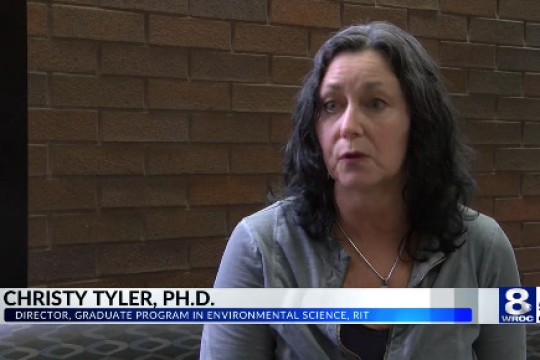New programs in sustainability
Submitted by Laura W. Nelson
RIT professor Raymond Grosshans and student Zachary Mott demonstrate a sustainability research project to Monroe County Executive Maggie Brooks during a recent tour.
RIT is building on its expertise to become a world leader in education and research that will transform waste and pollution-producing global enterprises into efficient, clean and near zero waste operations. This is the vision of the newly created Sustainability Institute that will be led by Nabil Nasr, assistant provost and director of the Center for Integrated Manufacturing Studies, and a world-renowned expert in the field of sustainability and environmental issues.
The Sustainability Institute will undertake comprehensive, interdisciplinary initiatives in education, research and technology transfer that build upon a set of RIT’s strongest academic programs and the internationally respected research of CIMS. A major element of the new Sustainability Institute will be comprehensive interdisciplinary Ph.D. and master’s of science programs in sustainable production. Graduate programs and related research will be defined and delivered by collaborating faculty and staff across RIT, along with new tenure-track and research faculty. In 2006, RIT was awarded a $465,000 grant from the Henry Luce Foundation for the development of the Ph.D. program, which will be one of the first of its kind in the world.
The Sustainability Institute will ultimately be located in a state-of-the-art “green” building housed on the RIT campus. The new facility will include laboratory and classroom space to support academic work as well as applied research efforts. Funding development and design for the new facility are now in the planning stages. The ultimate goal of the Sustainability Institute will be to produce our next generation of engineers, scientists and policy makers with groundbreaking research experience in sustainable technologies and systems, including pollution prevention, closed-loop supply-chain management, sustainable design and government policies for promoting sustainability. “Nabil Nasr has demonstrated an exemplary ability to develop successful partnerships with leading industries and government organizations, and is widely regarded as one of the most knowledgeable people in the nation and the world in the field of sustainability,” says RIT President Albert Simone. “He has chaired and participated in worldwide conferences on the subject, testified before congressional committees and led other forums that have included a broad range of industry and university experts. I have every confidence that his leadership will enable this initiative to become a signature program for RIT and a premier example of what it means to be a ‘category-of-one’ university.” “Through this new effort we hope to create a truly interdisciplinary core faculty team devoted to developing a tightly integrated interdisciplinary curriculum and attendant applied research program,” adds Nasr. “The core team will work closely and continually with leading industrial organizations, government agencies, educational institutions and other stakeholders to create programs that will meet our twin aims of enhanced economic development and improved environmental quality.”
The Ph.D. will consist of six program tracks: sustainable product design and realization, environmental studies, industrial ecology, technology and policy, sustainable business enterprise and renewable energy. Faculty within the Sustainability Institute, in collaboration with faculty across RIT, will also develop graduate certificate programs in various facets of sustainability that meet continuing education needs of business and industry partners. The research agenda for the Sustainability Institute will be a natural outgrowth of strong applied research programs and infrastructure at CIMS, which conducts several million dollars of applied research and technology transfer annually in the sustainability domain. Over the past 10 years, CIMS has completed hundreds of projects with both domestic and international companies ranging from the small to the Fortune 100, as well as government agencies ranging from local to federal to international. These efforts will be enhanced by additional research programs in academic units throughout RIT including the Nanopower Research Laboratories, the Department of Science Technology and Society/Public Policy, and the Kate Gleason College of Engineering, among others.















